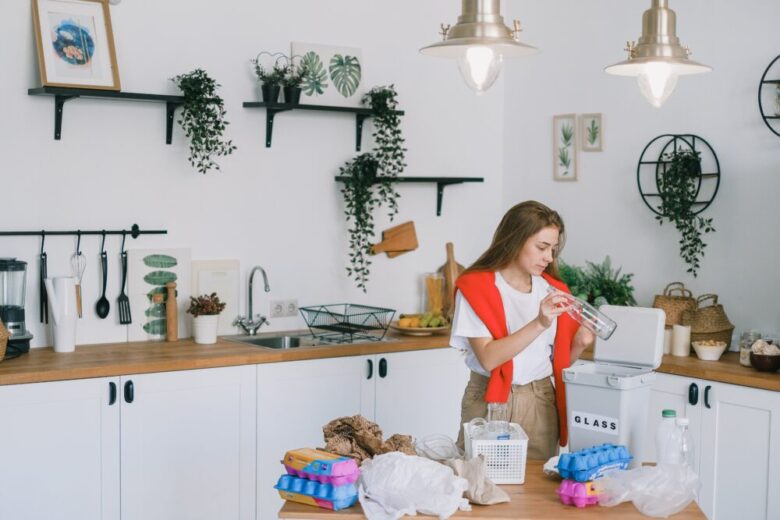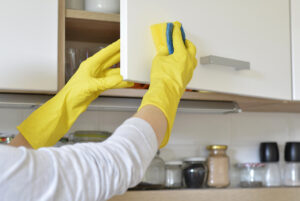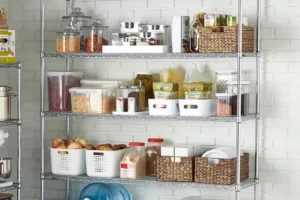In pursuit of a sustainable lifestyle, the kitchen, as the heart of the home, offers plenty of opportunities to implement environmentally friendly practices. These efforts go beyond reducing waste; they also include reducing the use of hazardous substances, conserving resources, and creating a healthier living environment. This guide explains how to make your kitchen cleaning routine more environmentally friendly, ensuring the well-being of your family and the planet.
Learn more about environmentally friendly cleaning
Switching to eco-friendly kitchen cleaning involves more than just choosing green products. It involves a holistic approach, taking into account the life cycle of products, from production to disposal, and their overall impact on the environment and human health. Traditional cleaning products can contain volatile organic compounds (VOCs), which contribute to indoor air pollution and are harmful to people and pets.
Natural cleaning products: a safer choice
The cornerstone of environmentally friendly cleaning is the use of natural cleaning products. These products are derived from materials that are safe for the earth, are often biodegradable, and do not contain the harsh chemicals found in many traditional cleaning products. For example, white vinegar, known for its disinfectant properties, combats limescale and removes grease, while baking soda is an excellent mild abrasive that can help scrub away stubborn stains.
DIY cleaning solutions: powerful and effective
Creating your cleaning solution gives you more power and control over the ingredients used in your home. A simple but effective recipe is to mix lemon juice, vinegar, and water to create a natural all-purpose cleaner. This not only reduces the chemical load in your home but also plastic packaging waste. Additionally, mixing vinegar with citrus peels or herbs can improve cleaning power and leave a refreshing scent.
Spend wisely and reduce waste
A minimalist approach to kitchen cleaning products can significantly reduce your impact on the environment. By focusing on all-purpose cleaners and durable, reusable tools, you can keep mess and waste to a minimum. Emphasizing quality over quantity can encourage more sustainable consumption patterns, following the principles of a circular economy.
Sustainable tools for environmentally friendly cleaning
The choice of cleaning tools is just as important as the choice of detergent. Choose items made from natural materials such as bamboo, wood, or recycled plastic, which are more sustainable than traditional materials. Reusable wipes made from organic cotton or bamboo can replace disposable paper towels, reducing waste and providing a more sustainable cleaning solution.
Water saving technology
Water is a precious resource and conserving water is essential for eco-friendly kitchen cleaning. Simple things like turning off the tap while washing dishes or collecting rainwater for cleaning can have a big impact. Furthermore, modern dishwashers are designed to be water efficient, and if you use them wisely you can further reduce water consumption.
The role of compost in cleaning the kitchen
Composting organic waste is an integral part of an eco-friendly kitchen. Composting helps reduce your carbon footprint by diverting food scraps from landfills, which release methane, a potent greenhouse gas. Furthermore, the resulting compost enriches the soil, supports plant growth, and promotes regenerative cycles.
Incorporate eco-friendly habits
Incorporating eco-friendly habits into your daily life is the key to maintaining a green kitchen. For example, immediately treating a spill with a natural cleaning solution can prevent the need for deeper cleaning later. Emphasizing regular maintenance rather than regular deep cleaning can also reduce the overall need for cleaning products and water.
Cultivate a culture of sustainability at home
Creating a sustainable living environment is a collective effort. By allowing family members to choose and use eco-friendly products, you can instill values of environmental stewardship. Teachable moments about the importance of these practices can create lasting change that extends beyond the confines of your home.
Stay up to date on environmental innovation
The field of sustainable living is dynamic, with constantly new products, practices, and insights. By staying abreast of these developments you can continually improve your eco-friendly kitchen cleaning routine, applying the most effective and sustainable practices.
Conclusion
Eco-friendly kitchen cleaning is an achievable goal that will benefit your health, your home, and the planet. By choosing natural cleaning products, reducing waste, conserving resources, and developing sustainable habits, you can create a greener, cleaner kitchen. Remember that small steps can lead to significant environmental consequences. Embrace these tips and tricks to propel you toward a more sustainable lifestyle.
FAQs
1. Do eco-friendly products clean as effectively as traditional cleaning products?
Yes, eco-friendly products can clean just as effectively as traditional cleaners. Natural ingredients such as vinegar, baking soda, and lemon have powerful cleaning properties that remove dirt, grease, and grime. For tougher jobs, more powerful eco-friendly options are available, formulated to be just as effective as their chemical counterparts.
2. Are homemade cleaners safe around pets and children?
Homemade cleaners made from natural ingredients are generally safer to use around pets and children than commercial cleaners that contain harsh chemicals. However, it is important to be careful when using cleaning products. For example, some essential oils can be toxic to pets. Always research and ensure the safety of cleaning solutions for all family members.
3. How do you make a dishwasher more environmentally friendly?
To make your dishwasher more environmentally friendly, make sure it is fully loaded before running a cycle to save water and energy. Choose an eco-friendly dishwasher detergent and consider using a vinegar rinse to remove stains from dishes. Additionally, energy consumption can be further reduced if you skip the heated drying option and let the dishes air dry.
4. What is the best way to store homemade cleaning products?
Homemade cleaning products should be stored in clean, reusable containers. Glass spray bottles are a good choice because they do not react with the ingredients inside and can be recycled. Clearly label each container with the contents and date of manufacture, as homemade solutions may have a shorter shelf life than commercial products.
5. What should I do with my old chemical cleaners when I switch to environmentally friendly products?
The responsible disposal of old chemical cleaning products is important to prevent environmental damage. Do not pour them down the drain. Instead, contact your local waste management agency and ask about its hazardous waste collection program. Many communities offer specific disposal locations or collection days for these items.



